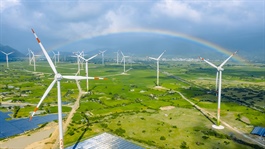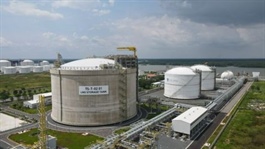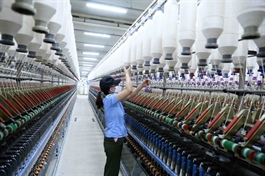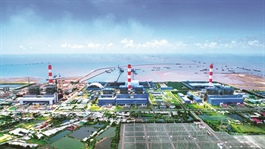Export turnover on track on back of global recovery
Export turnover on track on back of global recovery
Vietnam’s large trade surplus mirrors a gradual recovery in exporter performance and global demand, with hopes that new trade goals can be accomplished next year.

Fresh figures from the General Statistics Office (GSO) showed that following an on-year decline of 6.3 per cent in September, the export value in October stood at $32.25 billion, up 5.6 per cent on-year, and the figure for the first half of November is estimated to come at $14.65 billion, up 6.4 per cent on-year – in which domestic exporters raked in $4.01 billion – up 13.9 per cent, and foreign exporters fetched $10.64 billion (including crude oil exports) – up 3.9 per cent.
“Despite continued difficulties in export markets, Vietnam’s export turnover has been bouncing back thanks to a recovery in demands in global markets, especially at the year’s end when demands for goods are increasing in service of festivals, mostly the Christmas and New Year,” the GSO said.
Nguyen Van Vinh, sales director of wood product exporter Hong Vinh Trading JSC, said that his company has landed five orders from South Korea and Europe.
“The foreign partners have asked us to provide goods as soon as possible, and we have required our workers to work at full speed,” Vinh said. “We are now working with some other foreign partners about export contracts for Q1 next year.”
In the first nine months of this year, the company’s exports were in moderation, with some big losses incurred. However, the situation has improved since October.
“We are expecting revenues will be improved over the last three months of the year. However, it doesn’t mean that we will enjoy profits for the whole year – I think we will still suffer from a 5 per cent reduction of in revenue, with profits still decreasing,” Vinh added.
According to the GSO, despite an export rise since last month, Vietnam’s January-November 15 export revenue still saw an on-year reduction of 6.4 per cent, standing at $306.06 billion – in which domestic exporters earned $81.49 billion – down 2.6 per cent and accounting for 26.6 per cent of the economy’s total export value, and foreign exporters’ came at $224.57 billion (including crude oil exports) – down 7.7 per cent, responsible for 73.4 per cent.
In an example, mobile phones and their spare parts are reported to hit an export turnover of $46.31 billion, down 12.4 per cent on-year. Around 90 per cent of this involves Samsung.
At a meeting in late October with Vietnamese Prime Minister Pham Minh Chinh in Hanoi, Park Hark Kyu, president and CFO of Samsung Group, said that it wants to maintain its position as the largest foreign-invested enterprise in the country for the next two to three decades.
In the first nine months of the year, Samsung revenues are reported to have surpassed $48 billion, with exports contributing $42 billion, adding to Vietnam’s trade figures significantly.
Meanwhile, according to GSO, also in the January-November 15 period, the country’s total import turnover is estimated to hit $281.62 billion, down 11.7 per cent on-year – in which Vietnamese firms’ expenditures amounted to just over $100 billion, down 9.8 per cent and accounting for 35.7 per cent of the nation’s total import value, and foreign businesses’ spending reached $181.08 billion (including crude oil import value), down 12.7 per cent, and holding 64.3 per cent.
These have led to a large trade surplus of $24.44 billion, with total export-import turnover of $587.68 billion, down 9 per cent as compared to the corresponding period last year.
The Ministry of Industry and Trade is expecting that Vietnam’s export and import activities will continue flourishing in December and even into next year, largely backed by favourable factors at home and in the international market, where the global economy has shown positive recovery signals with better-than-expected growth.
Almost all international organisations have made forecasts that the global economy will increase slightly this year, as compared to their projections made in the first half of this year.
Specifically, the EU predicted that the rate will be 3.2 per cent, up 0.1 per cent from the projection made in May. The Organisation for Economic Co-operation and Development also followed suit, at 3 per cent – up 0.3 per cent from its forecast made in June. The International Monetary Fund revised its prediction to 3 per cent from 2.8 per cent made in April. Meanwhile, the World Bank has also said that the global economy will increase 2.1 per cent in 2023 – up 0.4 per cent from its projection in early this year.
The government has set a target that in 2024, the total export turnover will be $380 billion, up 6 per cent from the recorded figure this year. Total import turnover will be $365 billion next year, also up 6 per cent from the implemented figure for 2023, and the total trade surplus will be $15 billion.



























